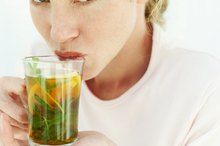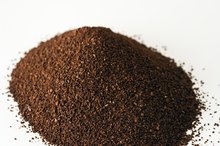What does fact checked mean?
At Healthfully, we strive to deliver objective content that is accurate and up-to-date. Our team periodically reviews articles in order to ensure content quality. The sources cited below consist of evidence from peer-reviewed journals, prominent medical organizations, academic associations, and government data.
The information contained on this site is for informational purposes only, and should not be used as a substitute for the advice of a professional health care provider. Please check with the appropriate physician regarding health questions and concerns. Although we strive to deliver accurate and up-to-date information, no guarantee to that effect is made.
Caffeine Content in One Cup of Coffee Vs. One Shot of Espresso
Brewed coffee and espresso both contain caffeine, which is a natural stimulant 4. Coffee is usually served by the cup, while espresso is served by the shot, although serving sizes can vary 4. Brewed coffee takes longer to make than espresso, which is typically thicker and stronger than brewed coffee 4.
Caffeine
One 8-ounce cup of coffee has 95 milligrams of caffeine and a 1-ounce single shot of espresso has 64 milligrams. Consuming too much caffeine can make you restless, anxious and irritable. It can also interact with certain medications. Pregnant women may need to cut back on caffeine consumption. While moderate caffeine consumption doesn't appear to cause miscarriage or preterm birth, according to The American College of Obstetricians and Gynecologists, it's still unclear whether high levels of caffeine consumption have any link to miscarriage, according to an article published in the August 2010 issue of "Obstetrics & Gynecology." Speak with your healthcare provider if you want to know if caffeine is safe for you.
- One 8-ounce cup of coffee has 95 milligrams of caffeine and a 1-ounce single shot of espresso has 64 milligrams.
- While moderate caffeine consumption doesn't appear to cause miscarriage or preterm birth, according to The American College of Obstetricians and Gynecologists, it's still unclear whether high levels of caffeine consumption have any link to miscarriage, according to an article published in the August 2010 issue of "Obstetrics & Gynecology.
- "
Related Articles
References
- United States Department of Agriculture, National Nutrient Database for Standard Reference: Coffee, Brewed, Espresso, Restaurant-prepared
- United States Department of Agriculture, National Nutrient Database for Standard Reference: Coffee, Brewed from Grounds, Prepared with Tap Water
- MedlinePlus: Caffeine
- PopSci: FYI: What Is Espresso?
- Coffee, brewed, prepared with tap water. FoodData Central. U.S. Department of Agriculture. Published April 1, 2019.
- Caffiene in coffee. FoodData Central. U.S. Department of Agriculture. Published April 1, 2019.
- McCusker RR, Fuehrlein B, Goldberger BA, Gold MS, Cone EJ. Caffeine content of decaffeinated coffee. J Anal Toxicol. 2006;30(8):611-3. doi:10.1093/jat/30.8.611
- Coffee, instant, reconstituted. FoodData Central. U.S. Department of Agriculture. Published April 1, 2019.
- U.S. Department of Agriculture. Coffee, espresso. FoodData Central. Published April 1, 2019.
- Tea, hot, leaf, black. FoodData Central. U.S. Department of Agriculture. Published April 1, 2019.
- Soft drink, cola. FoodData Central. U.S. Department of Agriculture. Published April 1, 2019.
- US Food & Drug Administration. Spilling the beans: How much caffeine is too much?. Updated December 12, 2018.
- Rogers PJ, Heatherley SV, Mullings EL, Smith JE. Faster but not smarter: Effects of caffeine and caffeine withdrawal on alertness and performance. Psychopharmacology (Berl). 2013;226(2):229-40. doi:10.1007/s00213-012-2889-4
- Freedman ND, Park Y, Abnet CC, Hollenbeck AR, Sinha R. Association of coffee drinking with total and cause-specific mortality. N Engl J Med. 2012;366(20):1891-904. doi:10.1056/NEJMoa1112010
- Voskoboinik A, Kalman JM, Kistler PM. Caffeine and arrhythmias: Time to grind the data. JACC Clin Electrophysiol. 2018;4(4):425-432. doi:10.1016/j.jacep.2018.01.012
- Papakonstantinou E, Kechribari I, Sotirakoglou Κ, et al. Acute effects of coffee consumption on self-reported gastrointestinal symptoms, blood pressure and stress indices in healthy individuals. Nutr J. 2016;15:26. doi:10.1186/s12937-016-0146-0
- The American College of Obstetricians and Gynecologists. Moderate Caffeine Consumption During Pregnancy. Committee Opinion: 462. Published August 2010.
- Drake C, Roehrs T, Shambroom J, Roth T. Caffeine effects on sleep taken 0, 3, or 6 hours before going to bed. J Clin Sleep Med. 2013;9(11):1195-200. doi:10.5664/jcsm.3170
- Alstadhaug KB, Andreou AP. Caffeine and primary (migraine) headaches-friend or foe?. Front Neurol. 2019;10:1275. doi:10.3389/fneur.2019.01275
- Lara DR. Caffeine, mental health, and psychiatric disorders. J Alzheimers Dis. 2010;20 Suppl 1:S239-48. doi:10.3233/jad-2010-1378
- National Institute of Diabetes and Digestive and Kidney Diseases. Eating, diet and nutrition for GER and GERD. Updated November 2014.
- Jiwani AZ, Rhee DJ, Brauner SC, et al. Effects of caffeinated coffee consumption on intraocular pressure, ocular perfusion pressure, and ocular pulse amplitude: A randomized controlled trial. Eye (Lond). 2012;26(8):1122-30. doi:10.1038/eye.2012.113
- Mitchell DC, Knight CA, Hockenberry J, Teplansky R, Hartman TJ. Beverage caffeine intakes in the U.S. Food Chem Toxicol. 2014;63:136-42. doi:10.1016/j.fct.2013.10.042
Writer Bio
Sheri Kay has a master's degree in human nutrition. She's the co-author of two books and has been a nutrition and fitness writer since 2004.









